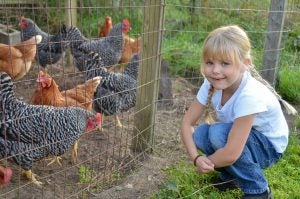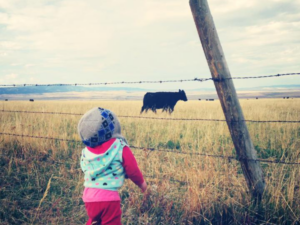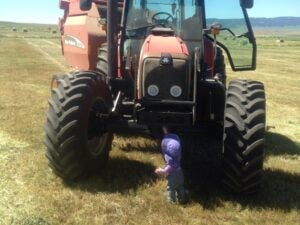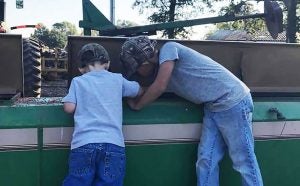When it comes to farming, the goal is often to keep the farm in the family, and the family in the farm. That likely means that either or both parents are working for the farm or the ranch, or that one parent will work off the farm some days.
And while we all love the idea of involving our kids in some aspects of farming or ranching, the reality is that not every agriculture-related job is suitable or safe for children. Each day, 33 children are injured in agricultural-related accidents. Every three days, a child dies on the farm.
The responsibility of completing tasks and making sure kids are safe is bound to slow down productivity and add stress to workers in an already stressful profession. In the worst cases, it’s going to put some of our most precious people — our children — at risk.
But the United States is in a childcare crisis, further exasperated by the challenges surrounding rural childcare for agricultural workers. For the folks who feed America, childcare issues have been widely ignored until recently.

Childcare issues extend to farm workers
I’ve never owned a farm or ranch, but when I had my daughter, the ranch that I worked on allowed me to continue working with her. I doctored cattle, branded, fed, hauled water, and rode horses until the final hours of my pregnancy.
My daughter’s first day of work was at a week old in a covered baby carrier (trying to shield her from smoke) while we branded the last bunch of spring calves. Over the next three years, she came alongside me every day in a carrier, car seat, and backpack on horses, four-wheelers, and tractors.
In a way, I loved that I had time with her. But the reality is that often, getting the job done on an understaffed operation without other qualified help meant that in an almost-daily balancing act, her needs weren’t always first priority and in that regard, the ranch usually won.

I would have loved to find a suitable childcare option because I wasn’t naïve enough to not understand the risk in the work I was doing. But, the closest town was over 30 miles away, and most of the year, the hours we worked were often so irregular, long, and never-ending that without family or closer connections, there seemed to be no way we could find an option that worked.
Even if we’d have found an option that worked, it would have meant that for much of the year, I’d have never seen my daughter. And if we’d have found an option, affording that option would have been a struggle for us. After all, farming margins can be tight, and that often extends to the salaries farm workers are paid.
On top of that, the constant hyper-vigilance and stress of having a child to care for during the workdays (and often nights), had a toll on our family. And it took a toll on me because like many mothers I’ve talked to, even though I was working full-time, the physical responsibility of caring for our household and our daughter fell almost solely on me.

I recall celebrating each birthday and milestone, not for celebration-sake, but out of relief that we’d all survived another year safely.
Talking to other agricultural workers, owners, and operators, I certainly wasn’t alone in these struggles.
Finding childcare for working parents in one of the most stressful and dangerous jobs in America certainly isn’t a clean-cut issue, and while we can acknowledge that there’s a problem, it’s a broad and difficult challenge to address.
Even farm and ranch owner-operators need help with childcare
In a perfect world, we imagine that the family farm comes complete with built-in childcare through grandma or grandpa, but we all know that nothing in this life is perfect.

A number of studies published in the Journal of Agromedicine delve into the issue. What these surveys and studies suggest is that farm parents may not be able to get help from their own parents with childcare because they were working, they’d passed away, or their health prevented it.
Parents are aware of the risks of farming, and a lack of adequate childcare is a source of stress. Some key takeaways from a 2023 survey addressing these issues include:
- Nine in ten farm families (97 percent) are concerned that their children could get hurt on the farm.
- Three-quarters of farm families (77 percent) report taking care of children affects their ability to get farm work done.
- Eight in ten farm families (88 percent) reported that someone in their household feels more stress and anxiety since the arrival of their children.
Rural America needs access to childcare that works
While research has consistently shown that childcare supports workforce development, allowing parents to work, childcare access and affordability also directly impact farmer-parents, off-farm employees, and the communities that surround farms.
Childcare decisions are often complicated by farm structure. Especially in the case of farming families, non-traditional, erratic, and often long hours may affect one or both parents.
Formal daycare typically follows a conventional workweek schedule. Farming does not, and a 7:30 a.m. to 5:30 p.m., Monday through Friday schedule doesn’t often work.
A 2023 National Farm Families Childcare Survey indicated that nearly three-quarters of farm families experienced childcare challenges within the last five years due to cost and availability, distance to childcare, and quality of childcare.
Solutions are underway
There’s not a one-size-fits-all solution in providing child care for Americans in agriculture, but solutions are underway.
For the first time, both the American Farm Bureau Federation and the National Farmers Union have included childcare in rural America under their 2023 farm bill priorities.
Adam Alson, a corn and soybean farmer in Jasper County, Ind. is leading the charge with his own, personal resources. Alson opened the doors this year on Appleseed Childhood Education, a nonprofit that will provide 12 hours of early learning opportunities from nearly birth to five years old.
Creekstone Farms, an ArkansasCity, Kansas-based meat processing facility is also set to open Walnut Valley Learning Center this year, a $3.5 million childcare learning center for its employees.
View this post on Instagram
The learning center will be a subsidiary of Creekstone Farms but will operate as a separate entity under the name Walnut Valley Learning Center, LLC. Company officials are planning to host a ribbon-cutting ceremony when the facility opens its doors.
Looking forward, if Americans want agriculture to continue to be a viable vocation, farm families are going to need help with childcare.
Heidi Crnkovic, is the Associate Editor for AGDAILY. She is a New Mexico native with deep-seated roots in the Southwest and a passion for all things agriculture



